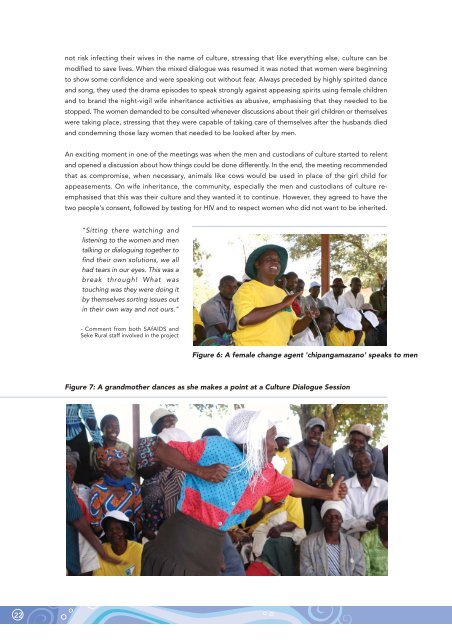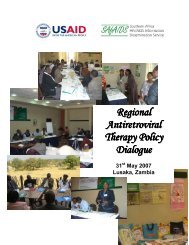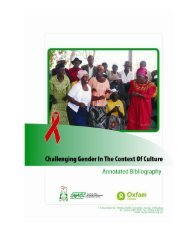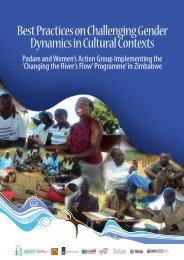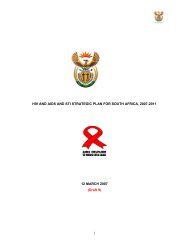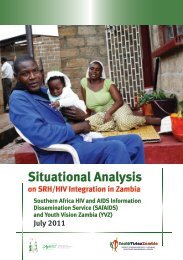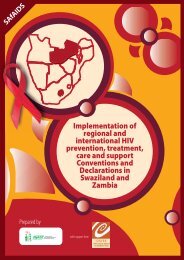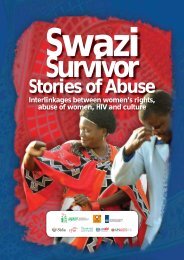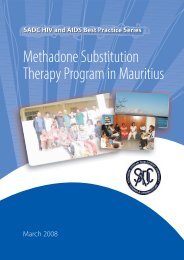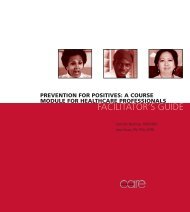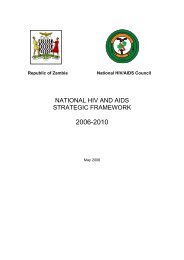still valid, was demanding sex and refusing to be tested for HIV first. All efforts by the woman to get helpfrom the family and community leaders and from the church had resulted in no help or action from anyquarter. Everyone pointed out to her that it was her responsibility to fulfil her marital obligations, <strong>of</strong> whichthe most important was having sex with her husband in spite <strong>of</strong> everything. According to the community,any woman who denied her husband sex was committing an unforgivable crime and would face the wrath<strong>of</strong> the spirits, even on her children and their children. From a religious point, the argument was aboutforgiveness; as a good wife and a Christian, the wife was expected to forgive her husband and move onwith life. It was God's role, not hers, to punish sinners. At the time, the woman was feeling helpless andready to give in to her husband's demands, even though she knew <strong>of</strong> the risks <strong>of</strong> HIV. This was a typicalexample <strong>of</strong> a practise that was putting women at risk and the community could not make the importantlinkage.During the first meeting, the men were blaming women for being beaten and cheated on; "they" (women)were refusing sex, 'they" were not that good in bed, or "they" were nagging. According to the men, it wasthe fault <strong>of</strong> women that men had 'small houses' or multiple partners and that young girls were going intoprostitution because their mothers were not teaching them well. There were repeated statements about;"these are our cultures and traditions and they can never change, even in the face <strong>of</strong> HIV." Some <strong>of</strong> thecultures and traditional practices being defended were wife inheritance, spirit appeasement with the girlchild, kugata - consulting traditional healers in the event <strong>of</strong> a death in the family, virginity testing <strong>of</strong> girlsand polygamy. As project staff we felt disheartened listening to the men. On the other hand, the womenindicated that they were tired <strong>of</strong> bearing the brunt <strong>of</strong> it all; widows were being forced to have sex at nightby their late husband's brothers, even though in public the same men would claim that they no longerbelieved in the practice <strong>of</strong> widow inheritance. For these women, it seemed like there was no recourse asthey feared being forcibly removed from the matrimonial home if they refused. Men were refusing to betested for HIV or to use condoms within the marriage, even if they were openly having extra-marital affairs.Women blamed the men for bringing HIV into the homes but added that they had no power to stop themor to deny them sex or leave as most had no means <strong>of</strong> income.The 'custodians <strong>of</strong> culture' group, which was predominantly made up <strong>of</strong> men (<strong>of</strong> interest is the fact thatthere was only one woman in this group) also stressed the need to preserve the people's cultures. Theyemphasised that this was their role as custodians and pointed out that if culture was not respected, thecommunity was likely to face the wrath <strong>of</strong> the sprits which would come in the form <strong>of</strong> many calamities aswas being observed in the case <strong>of</strong> AIDS and droughts.In the face <strong>of</strong> such obvious resistance from the men in particular, the project chose to focus on strengtheningknowledge on how the said harmful practices were linked to fuelling HIV and the deaths <strong>of</strong> loved ones inthe community, rather than to argue with them about what was right and wrong. The Drama group showeda number <strong>of</strong> dramas to highlight these practices and the inter-linkages, followed by intense dialogue/discussions among community members themselves. The project staff stayed in the background and onlylistened and watched. In summarising the discussions, they would use the opportunity to educate andcorrect myths and misconceptions. HIV targeted materials would be distributed to the community andfollow-up dialogues scheduled.Round 2 - A glimpse <strong>of</strong> hope and the role <strong>of</strong> FacilitatorsThe second round <strong>of</strong> dialogues continued with a focus on continuing to build a good understanding <strong>of</strong> thelinkages between the various practices and gender, HIV and culture. A female Facilitator worked with thewomen to equip them with skills to speak out. Their issues were refined to move from emotive expressionsto more clear, concise and prioritised ideas that were presented to the men in the mixed meeting. On theother hand a male Facilitator worked with the men to have a "men to men" talk about how good men do21
not risk infecting their wives in the name <strong>of</strong> culture, stressing that like everything else, culture can bemodified to save lives. When the mixed dialogue was resumed it was noted that women were beginningto show some confidence and were speaking out without fear. Always preceded by highly spirited danceand song, they used the drama episodes to speak strongly against appeasing spirits using female childrenand to brand the night-vigil wife inheritance activities as abusive, emphasising that they needed to bestopped. The women demanded to be consulted whenever discussions about their girl children or themselveswere taking place, stressing that they were capable <strong>of</strong> taking care <strong>of</strong> themselves after the husbands diedand condemning those lazy women that needed to be looked after by men.An exciting moment in one <strong>of</strong> the meetings was when the men and custodians <strong>of</strong> culture started to relentand opened a discussion about how things could be done differently. In the end, the meeting recommendedthat as compromise, when necessary, animals like cows would be used in place <strong>of</strong> the girl child forappeasements. On wife inheritance, the community, especially the men and custodians <strong>of</strong> culture reemphasisedthat this was their culture and they wanted it to continue. However, they agreed to have thetwo people's consent, followed by testing for HIV and to respect women who did not want to be inherited."Sitting there watching andlistening to the women and mentalking or dialoguing together t<strong>of</strong>ind their own solutions, we allhad tears in our eyes. This was abreak through! What wastouching was they were doing itby themselves sorting issues outin their own way and not ours."- Comment from both <strong>SAfAIDS</strong> andSeke Rural staff involved in the projectFigure 6: A female change agent 'chipangamazano' speaks to menFigure 7: A grandmother dances as she makes a point at a Culture Dialogue Session22


